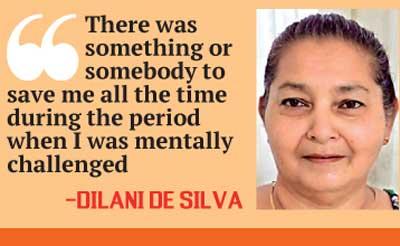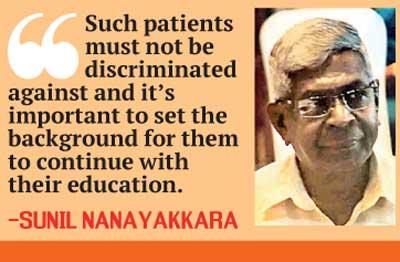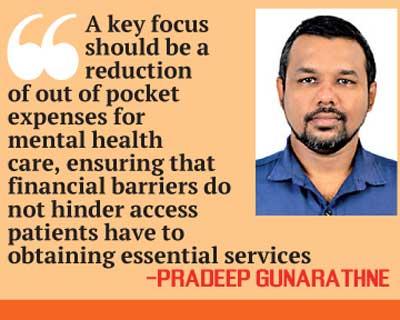09 Oct 2023 - {{hitsCtrl.values.hits}}
All the medical experts who spoke to this newspaper regarding the ‘human rights’ of mentally challenged people underscored the need to create an environment where there are people around them who’ll love, respect and acknowledge their existence
World Mental Health Day is celebrated annually on October 10 and the health authorities of this nation work within limitations and restrictions in elevating the status of mentally challenged people.
work within limitations and restrictions in elevating the status of mentally challenged people.
One talks about restrictions because mentally challenged patients receiving treatment and coming under the care of medical experts can only have hope in their lives that the system in the country they live in caters to such individuals with special needs. Receiving medical attention and medicine in a country like Sri Lanka can be a challenge in itself for such people. However in other affluent countries this human right of such patients is guaranteed by most governments and health institutions.
 The good news for such patients in Sri Lanka is that this year the theme for World Mental Health Day is ‘Mental Health is a universal human right’. Dr. Jayan Mendis, Senior Psychiatrist and Founder Director of the National Institute for Mental Health, in an interview with the Daily Mirror underscored the importance of understanding the importance of not neglecting mentally challenged individuals. “We need to treat patients as early as possible and by doing so complications and further disability to them can be reduced. Such patients must be treated equally as a patient having a physical ailment. There shouldn’t be a shortage in the services of medical professionals and medicines for
The good news for such patients in Sri Lanka is that this year the theme for World Mental Health Day is ‘Mental Health is a universal human right’. Dr. Jayan Mendis, Senior Psychiatrist and Founder Director of the National Institute for Mental Health, in an interview with the Daily Mirror underscored the importance of understanding the importance of not neglecting mentally challenged individuals. “We need to treat patients as early as possible and by doing so complications and further disability to them can be reduced. Such patients must be treated equally as a patient having a physical ailment. There shouldn’t be a shortage in the services of medical professionals and medicines for patients who are mentally challenged. Receiving these services is a human right of such individuals,” said Dr. Mendis.
patients who are mentally challenged. Receiving these services is a human right of such individuals,” said Dr. Mendis.
Such patients go through hardships and severe challenges during the initial treatment phase. There are heartwarming and success stories associated with individuals who were once virtually written off by loved ones and the society. Sunil Nanayakkara, Director Operations Collective for Advocacy and Networking in Mental Health Sri Lanka (CANMH) advocates inclusion of such patients in the day-today activities of the society; of course receiving treatment.
“When patients record progress after being treated they must be taught some profession or skill, so that they too can finance their expenses and also contribute to the income of the family. It’s important to build up their economy. Such patients must not be discriminated against and it’s important to set the background for them to continue with their education. Collective action is needed to protect their human rights,” said Nanayakkara.
can finance their expenses and also contribute to the income of the family. It’s important to build up their economy. Such patients must not be discriminated against and it’s important to set the background for them to continue with their education. Collective action is needed to protect their human rights,” said Nanayakkara.
These are days when news is abundant regarding the shortage of essential drugs. Hence patients, of all levels and suffering from different illnesses, are being forced to incur huge expenses to obtain their medicines. Pradeep Gunarathne, Occupational Therapist and National Organizer of CANMH Lanka said, “A key focus should be a reduction of out of pocket expenses for mental health care, ensuring that financial barriers do not hinder access patients have to obtaining essential services”.
 Coming back to the topic of success stories associated with patients, who have recovered considerably and have stepped back into society with much hope, what Dilani de Silva’s has to share is inspiring. She was once an in-house patient at the NIMH and has recovered quite well to make a comeback to life and realise some of her dreams which were distant to her during her troubled times. Dilani is a soft-toys designer and shares her creative skills with patients, who are still under treatment. She plays the role in using art as a therapy. “There was something or somebody to save me all the time during the period when I was mentally challenged. All the hard journeys in life have made me strong. All I want to do is offer support and strength to other mentally challenged females by sharing my skills with them during their difficult period,” said Dilani who is connected with CANMH Lanka as a representative while being gainfully employed as a soft-toys designer.
Coming back to the topic of success stories associated with patients, who have recovered considerably and have stepped back into society with much hope, what Dilani de Silva’s has to share is inspiring. She was once an in-house patient at the NIMH and has recovered quite well to make a comeback to life and realise some of her dreams which were distant to her during her troubled times. Dilani is a soft-toys designer and shares her creative skills with patients, who are still under treatment. She plays the role in using art as a therapy. “There was something or somebody to save me all the time during the period when I was mentally challenged. All the hard journeys in life have made me strong. All I want to do is offer support and strength to other mentally challenged females by sharing my skills with them during their difficult period,” said Dilani who is connected with CANMH Lanka as a representative while being gainfully employed as a soft-toys designer.
All the medical experts who spoke to this newspaper regarding the ‘human rights’ of mentally challenged people underscored the need to create an environment where there are people around them who’ll love, respect and acknowledge their existence. “If that can be done mentally challenged people can consider completing 75 of the journey towards recovery,” said Nanayakkara.
09 Jan 2025 24 minute ago
09 Jan 2025 56 minute ago
09 Jan 2025 1 hours ago
09 Jan 2025 1 hours ago
09 Jan 2025 2 hours ago